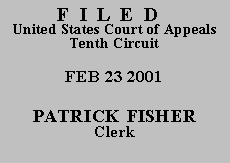

| JEFFREY M. YOUNG-BEY,
v.
RANDY SWANSON |
No. 00-3272
(D.C. No. 98-CV-3126) (D. Kan.) |
Federal prisoners are ordinarily allowed to make telephone calls to people on their official telephone list. See 28 C.F.R. § 540.101(a). When a prisoner submits a name for the list, he is representing that to the best of his knowledge, that person is agreeable to receiving telephone calls from him. See id. § 540.101(a)(1). If a prisoner seeks to add a person who is not immediate family or on his visiting list, the prison will ordinarily advise the potential recipient of the prisoner's telephone calls that "the recipient's number will be removed from the list if the recipient makes a written request to the institution." Id. § 540.101(a)(2). The record of administrative appeals in this case shows that the prison removed one person(1) from Young-Bey's approved telephone list at that person's request and ordered Young-Bey not to submit future requests to call that person. (No. 98-CV-3126, doc. 11, attach. 1.) When Young-Bey nevertheless submitted such a request, he was disciplined. (Id.) Under the authority of Van Woudenberg ex rel. Foor v. Gibson, 211 F.3d 560, 568 (10th Cir. 2000), the district court took judicial notice of this and other information from Young-Bey's related habeas case. (No. 98-CV-3126, doc. 36, at 3-4.)
The district court granted Young-Bey's motion to have the U.S. Marshal appointed for service of process. (No. 98-CV-3126, doc. 27, at 2; No. 99-CV-3080, doc. 19, at 3.) In a second order, the district court dismissed the statutory claims (other than the civil-rights claims) as frivolous and the rest of the claims for failure to state a claim upon which relief can be granted. (No. 98-CV-3126, doc. 36, at 5-6.)
Young-Bey raises two issues on appeal. First, he argues the district court violated the law-of-the-case doctrine by dismissing his complaint after ordering service on Defendants. We note first that the district court's order appointing the U.S. Marshal did not direct service of process on Defendants; in one of the orders, the court specifically noted that it was granting Young-Bey's motion "subject to the court's finding that service is appropriate in this action." (No. 99-CV-3080, Doc. 19, at 3.) Further, the second order did not "reconsider[]" or "over-rule[]" the earlier order, as Young-Bey asserts. (Opening Brief at 2.) Finally, 28 U.S.C. § 1915(e)(2) requires a court to dismiss a complaint "at any time" if it fails to state a claim, regardless of whether the defendants have been served. We therefore find no error on this issue.
Second, Young-Bey argues that the court erred in dismissing his complaint. We review the dismissal for failure to state a claim de novo. See Hunt v. Uphoff, 199 F.3d 1220, 1223 (10th Cir. 1999). We review the dismissal of a claim as frivolous for abuse of discretion. See Schlicher v. Thomas, 111 F.3d 777, 779 (10th Cir. 1997).
A regulation that infringes on Young-Bey's constitutional right to communicate with people outside the prison is valid if it is "reasonably related to legitimate penological interests." Turner v. Safley, 482 U.S. 78, 89 (1987). We agree with the Eleventh Circuit that "[r]eduction of criminal activity and harassment qualifies as a legitimate governmental objective." Pope v. Hightower, 101 F.3d 1382, 1385 (11th Cir. 1996). The federal regulation is well-tailored to advance this objective by allowing potential recipients of prisoners' telephone calls to block communication from a prisoner. Similar reasoning governs the alleged restriction of Young-Bey's mail privileges. For substantially the reasons stated by the district court, we AFFIRM its dismissal of the complaints.(2)
We GRANT Young-Bey's motion to seal the file on appeal. We remind him of his obligation to continue making partial payments of appellate costs and fees until paid in full.
ENTERED FOR THE COURT
David M. Ebel
Circuit Judge
*.After examining appellant's brief and the appellate record, this panel has determined unanimously that oral argument would not materially assist the determination of this appeal. See Fed. R. App. P. 34(a)(2) and 10th Cir. R. 34.1(G). The case is therefore ordered submitted without oral argument. This Order and Judgment is not binding precedent, except under the doctrines of law of the case, res judicata, and collateral estoppel. The court generally disfavors the citation of orders and judgments; nevertheless, an order and judgment may be cited under the terms and conditions of 10th Cir. R. 36.3.
1.The record is sealed, and in an abundance of caution we have chosen not to identify this person.
2.We express no view on the district court's alternative suggestion that these lawsuits would be barred by Heck v. Humphrey, 512 U.S. 477 (1994), and Edwards v. Balisok, 520 U.S. 641 (1997).